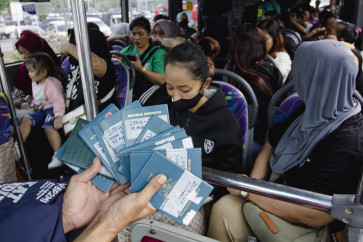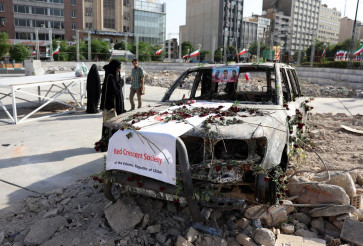Popular Reads
Top Results
Can't find what you're looking for?
View all search resultsPopular Reads
Top Results
Can't find what you're looking for?
View all search resultsHotels in Bali instructed to maintain hygiene standards
Bali Governor Made Mangku Pastika on Saturday called on hotel operators on the island to maintain good standards of hygiene and implement necessary measures to ensure the standards would not be compromised
Change text size
Gift Premium Articles
to Anyone

B
ali Governor Made Mangku Pastika on Saturday called on hotel operators on the island to maintain good standards of hygiene and implement necessary measures to ensure the standards would not be compromised.
The call was made in the wake of recent media reports of a possible outbreak of Legionnaires’ disease in the island’s most popular tourist destination, Kuta.
“We are currently investigating the outbreak. Temporary conclusion point to waste water from an air-conditioning system as the origin of the bacteria responsible for the outbreak,” Pastika said.
The US Centers for Disease Control and Prevention (CDC) said on its website that the Legionella bacteria were found naturally in the environment, usually in water.
The bacteria grows best in warm water, the kind found in hot tubs, cooling towers, hot water tanks, large plumbing systems, or parts of the air-conditioning systems of large buildings. However, they do not seem to grow in car or window air-conditioners.
Australian media said the country’s authorities had warned citizens who had recently visited Bali to be alert for symptoms after 10 Australians were treated for the potentially fatal flu-like disease. Five Australians were diagnosed with severe pneumonia after returning from holidays in Bali in December.
The disease often affects middle-aged and elderly people, particularly those who smoke or who have lung disease, diabetes, kidney disease or a weakened immune system.
Symptoms are similar to a severe flu and include fever, chills, muscle soreness, headaches, tiredness, reduced appetite, diarrhea, dry coughing and breathlessness. It is contracted through inhalation of contaminated water droplets and is not known to be transmitted from person to person.
Bali Health Agency chief Nyoman Sutedja is leading the investigation into the outbreak.
Following information provided by the Australian government, the agency’s team of experts visited and inspected the water processing systems and facilities at several hotels around Kuta Square. Sutedja described Kuta Square as “the area where the bacteria may have possibly come from”.
However, the Bali administration has not conclusively identified the exact location or named the hotel where the Australians were infected.
“The majority of the Australians infected by the disease stayed at one specific hotel in Kuta. It is likely that the bacteria was present only at that hotel, but we are investigating further,” Mangku Pastika stressed.
The governor instructed hotels to pay special attention to their air-conditioning systems, saying they should be checked and cleaned regularly to prevent a similar outbreak from occurring in the future.
Similar sentiments were echoed by the head of the Chief Engineers Association (ACE), Made Sumantra. He pointed out that there were hotels that, either out of negligence or ignorance, did not implement adequate health-related safety measures, particularly in maintaining hygiene standards of their swimming pools and water supply.
“I urge the local administration to invite all hotel owners to draft new, tighter standards of hygiene and health-related safety measures,” he said, adding that non-star-rated hotels generally don’t have any engineering post on their payroll, thus complicating the actual implementation of any health-related measures.
Star-rated hotels make up only 157 of the 2,175 lodging facilities on the island.
The secretary of the Bali branch of the Indonesia Hotels and Restaurants Association (PHRI), Perry Markus, expressed skepticism that the outbreak started in a hotel and urged the local administration to immediately determine the site of the first infection.









